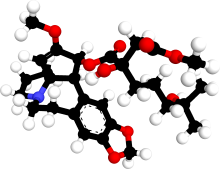Omacetaxine mepesuccinate
 |
|
 |
|
| Clinical data | |
|---|---|
| Trade names | Synribo |
| AHFS/Drugs.com | Monograph |
| License data | |
| Pregnancy category |
|
| Routes of administration |
Subcutaneous, intravenous infusion |
| ATC code | |
| Legal status | |
| Legal status |
|
| Pharmacokinetic data | |
| Protein binding | 50% |
| Metabolism | Mostly via plasma esterases |
| Biological half-life | 6 hours |
| Excretion | Urine (≤15% unchanged) |
| Identifiers | |
|
|
| CAS Number | |
| PubChem CID | |
| IUPHAR/BPS | |
| ChemSpider | |
| UNII | |
| KEGG | |
| ChEBI | |
| ECHA InfoCard | 100.164.439 |
| Chemical and physical data | |
| Formula | C29H39NO9 |
| Molar mass | 545.62 g/mol |
| 3D model (Jmol) | |
|
|
|
|
Omacetaxine mepesuccinate (INN, trade names Synribo or Myelostat ), formerly named as homoharringtonine or HHT, is a pharmaceutical drug substance that is indicated for treatment of chronic myeloid leukemia (CML). It is a natural product first discovered in Cephalotaxus harringtonia, now manufactured by hemi-synthesis. It was approved by the US FDA in October 2012 for the treatment of adult patients with CML with resistance and/or intolerance to two or more tyrosine kinase inhibitors (TKIs).
Omacetaxine/homoharringtonine is indicated for use as a treatment for patients with chronic myeloid leukaemia who are resistant or intolerant of tyrosine kinase inhibitors.
In June 2009, results of a long-term open label Phase II study were published, which investigated the use of omacetaxine infusions in CML patients. After twelve months of treatment, about one third of patients showed a cytogenetic response. A study in patients who had failed imatinib and who had the drug resistant T315I mutation achieved cytogenetic response in 28% of patients and hematologic response in 80% of patients, according to preliminary data.
Phase I studies including a small number of patients have shown benefit in treating myelodysplastic syndrome (MDS, 25 patients) and acute myelogenous leukaemia (AML, 76 patients). Patients with solid tumors did not benefit from omacetaxine.
By frequency:
Very common (>10% frequency):
Common (1-10% frequency):
† Myelosuppression, including: thrombocytopenia, anaemia, neutropenia and lymphopenia, in descending order of frequency.
...
Wikipedia
